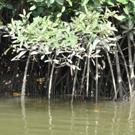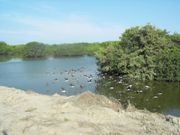El Bendito: the Peruvian Pacific
Sylviane Bilgischer (Belgium/ Perú), Roberta Colombano (Italy/Netherlands), and Carolina Quiroz (Mexico) began developing a project to restore and conserve a fragile Mangrove ecosystem in a village in Perú in January.
| Young Mangroves in El Benedito |
|
 |
El Bendito is located close to the Tumbes in Perú comprising a portion of the eco-region of mangroves in the Gulf of Guayaquil. This is a protected area for the conservation of mangroves. This community lives in close relation with mangroves through the extraction of hydro biological products. |
After a participatory needs assessment they discovered that the community members of El Bendito are finding it difficult to maintain productive livelihoods due to an increasingly stressed mangrove ecosystem linked to climate change related variable weather patterns and rising sea levels, and solid waste placing additional pressure on mangrove forest resources (such as shellfish and crab).
| A mangrove forest in its natural habitat |
|
 |
After a thorough literature review and discussions with colleagues they developed their project using two compatible programs–a mangrove restoration program and a solid waste management program:
|
[Problem 3]. Increasingly stressed mangrove ecosystem
Mangrove protection Program [Solution to underlying causes: variable weather patterns and rising sea levels]:
[Activity 1]. Workshop on the importance of mangroves to the health of their fisheries
[Activity 2]. Workshop on community involvement for mangrove restoration or reforestation
[Activity 3]. Facilitate the organization of the community-based mangrove forest management committee
[Activity 4]. Mapping and Identifying degraded mangrove systems
[Activity 5]. Mangroves restoration (by a “put into action” workshop)
Their solid waste program places importance on a governmental advocacy campaign:
Solid waste management Program [Solution to underlying cause: lack of a government management plan and infrastructure investment]:
[Activity 1]. Solid waste awareness workshop, quick-wins through local actions and follow-up
[Activity 2]. Facilitate the organization of a community-based solid waste management committee
[Activity 3]. Develop an advocacy campaign to determine the best way of Elaborating of a solid waste management plan by the Provincial Government
Download their report and needs assessment:
Needs assessment
Would you like to learn how to develop Community Based Adaptation Projects?
Please write us with your stories, thoughts and comments through Online.Learning@csd-i.org